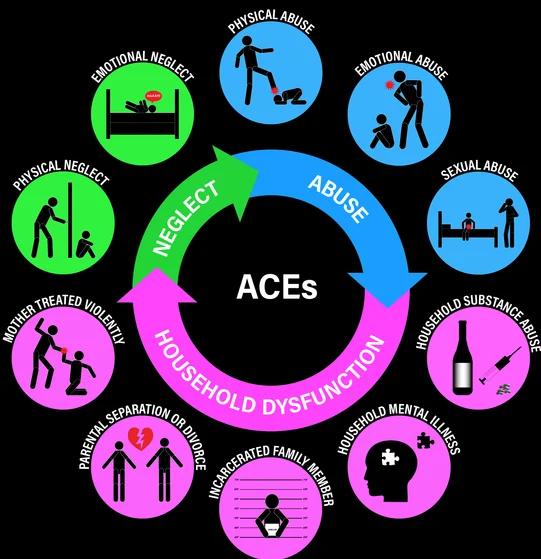
Adverse childhood experiences (ACEs) encompass potentially traumatic events occurring before the age of 18 years. These can include physical, emotional, or sexual abuse; domestic violence; neglect; and having a parent who is incarcerated, addicted to drugs, or suffering from mental illness. However, research has shown that these experiences tend to be clustered for many people. Exposure to ACEs can physically change how a child’s brain develops.
There is a growing body of evidence that suggests a strong link between childhood experiences and crime. Research has shown that Adverse childhood experiences (ACEs) are linked to a range of adult health problems, including heart disease, cancer, stroke, obesity, diabetes, and substance abuse. They are also associated with an increased risk of criminal behavior.
One study found that nearly 60% of male inmates in state prisons had experienced some form of abuse during their childhoods. Another study found that 70% of juveniles in detention had been exposed to at least one form of a traumatic event, such as physical or sexual abuse, witnessing violence, or living in a household with substance abusers.
These findings suggest that childhood experiences play a significant role in the development of criminal behavior. However, it is important to note that not all children who experience trauma will go on to commit crimes. There are several other factors, such as genetic predisposition and peer influence, that can also contribute to the development of criminal behavior.
What Is the Connection Between Adverse Childhood Experiences and Crime?
There is a strong link between adverse childhood experiences and criminal behavior. Individuals who have experienced ACEs are more likely to engage in criminal activity than adults.
This is thought to be because Adverse childhood experiences (ACEs) can lead to problems with mental health, substance abuse, and impulsivity, which can all contribute to criminal behavior.
Genetic Predisposition
Genetic predisposition to the development of criminal behavior in children cannot be denied. Genetic predisposition is a topic of ongoing research. However, the specific etiology of this predisposition is not yet known. Several studies have shown that early childhood experiences are critical to the development of criminal behavior in later life. One such study followed a group of children who were raised in institutions and found that they were more likely to engage in criminal behavior than those who were raised in families.
Other studies have shown that abuse and neglect in childhood are significant risk factors for the development of criminal behavior. Children who experience abuse or neglect are more likely to engage in antisocial behaviors, including violence, as adults. Additionally, these children are more likely to have mental health problems, which can further contribute to their likelihood of engaging in criminal behavior.
Peer Influence
Peer influence can also be a significant factor in the development of criminal behavior in children. Children who associate with delinquent peers are more likely to engage in criminal activity themselves. This is particularly true for teenagers, who are often more susceptible to peer pressure.
Peer influence on the development of criminal behavior in children is a topic of great concern to parents, teachers, and law enforcement officials. The impact of peer pressure on crime rates among young people is especially pronounced during adolescence when teenagers are more likely to take risks and engage in criminal activity.
Several studies have shown that children who grow up in homes where there is violence or substance abuse are more likely to engage in criminal behavior themselves. Other risk factors for developing criminal behavior include poverty, poor parental supervision, and exposure to gangs and other delinquent peers.
While it is important to be aware of the potential risks associated with these factors, it is also important to remember that not all children who experience them will go on to commit crimes. Many resiliency factors can protect children from the negative effects of their environment, including positive family relationships, strong social connections, and involvement in pro-social activities.
Help Your Child
If you are concerned about your child’s involvement with delinquent peers, it is important to take action right away. Talk to your child about the dangers of associating with criminals, and make sure they know that you disapprove of their behavior. You may also want to consider enrolling them in a program that provides positive role models and activities. It is important to be aware of the potential risks associated with these factors.
Adverse childhood experiences (ACEs) play a significant role in the development of criminal behavior. However, the specific mechanisms by which these experiences lead to crime are not yet fully understood. Future research on this topic is needed to better understand how to prevent crime by addressing the early childhood experiences that contribute to its development.
Providing a stable and loving home environment, ensuring that they receive proper medical and mental health care, and helping them develop positive coping skills are all important steps in prevention. If you have any concerns about your child’s behavior, please don’t hesitate to contact a professional for help.
How Can We Prevent Crime If We Know That Adverse Childhood Experiences Are a Risk Factor?
If we know that adverse childhood experiences are a risk factor for crime, then we can work to prevent them from happening in the first place. This can be done through programs that provide support to families who are experiencing aches. No one should view adverse childhood experiences as “just a way of life” for certain youths living in troubled communities.
It is also important to provide support to individuals who have already experienced ACEs. This can help to reduce the likelihood of them engaging in criminal behavior as adults. If you have experienced ACEs, there is help available. Please reach out to a mental health professional or organization that can provide support.
Please note: This is not meant to be a comprehensive guide on the topic of adverse childhood experiences and crime. If you are seeking more information, please consult with a mental health professional or another expert on the subject.